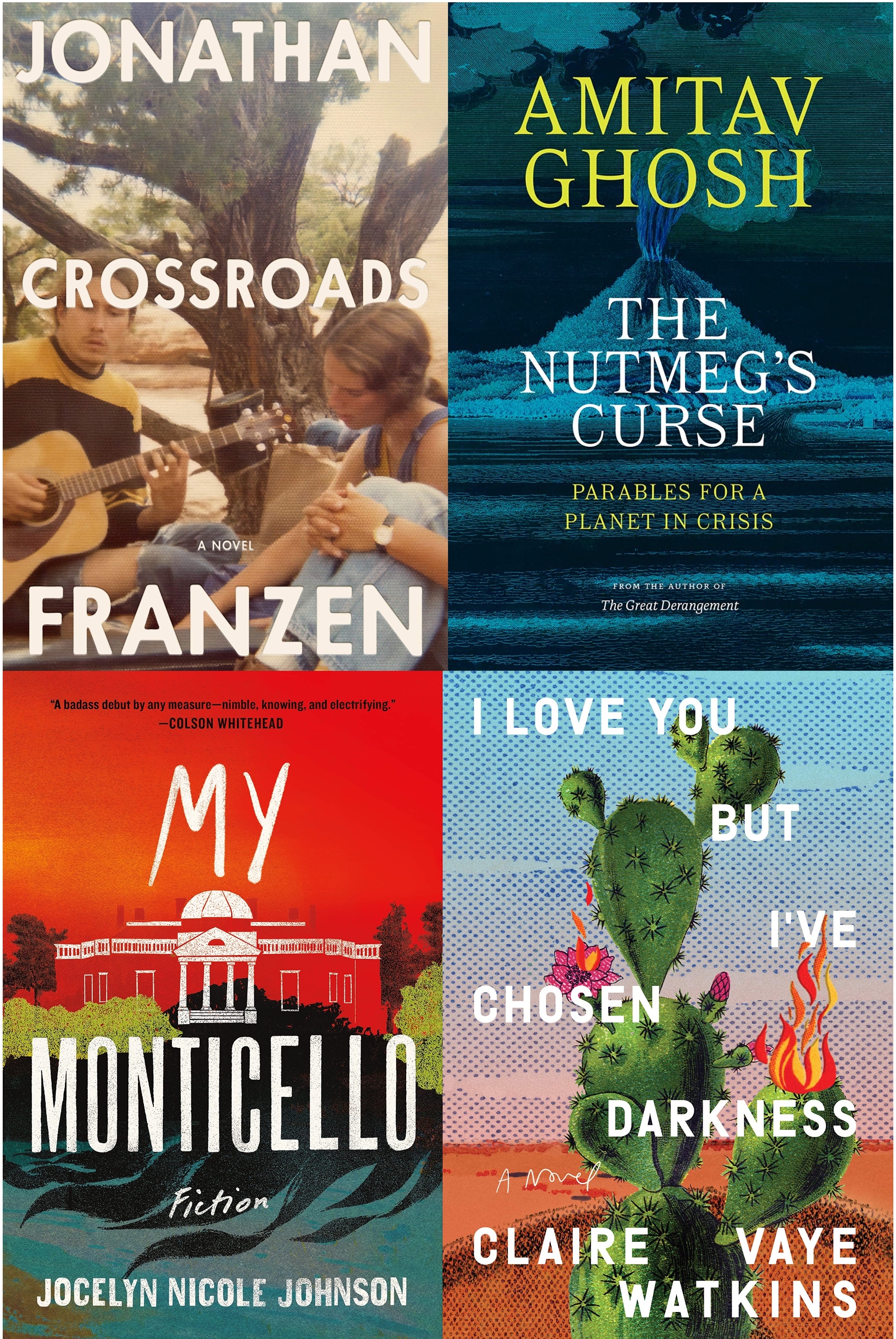We wouldn’t dream of abandoning our vast semi–annual Most Anticipated Book Previews, but we thought a monthly reminder would be helpful (and give us a chance to note titles we missed the first time around). Here’s what we’re looking out for this month. Let us know what you’re looking forward to in the comments!
Want to know about the books you might have missed? Then go read our most recent book preview. Want to help The Millions keep churning out great books coverage? Then sign up to be a member today.
 Crossroads by Jonathan Franzen: Whether he’s insulting Oprah or posing self-importantly as “The Great American Novelist” on the cover of Time, Franzen has a singular talent for arousing public contempt. But the fact is he writes good books. Here, he returns to his literary roots in the story of a troubled family, the Hildebrandts, fractured by the cultural upheaval of the early 1970s. The novel is the first in a planned trilogy, with the Middlemarchian title “A Key to All Mythologies,” that will span three generations of the Hildebrandt clan. (Michael)
Crossroads by Jonathan Franzen: Whether he’s insulting Oprah or posing self-importantly as “The Great American Novelist” on the cover of Time, Franzen has a singular talent for arousing public contempt. But the fact is he writes good books. Here, he returns to his literary roots in the story of a troubled family, the Hildebrandts, fractured by the cultural upheaval of the early 1970s. The novel is the first in a planned trilogy, with the Middlemarchian title “A Key to All Mythologies,” that will span three generations of the Hildebrandt clan. (Michael)
 My Monticello by Jocelyn Nicole Johnson: In her debut collection, Johnson explores a world (and country) ever on the brink and the people who choose to survive no matter the cost. In the titular novella, set in the near future, a Black descendant of Thomas Jefferson and Sally Hemings is driven from her home by violent white supremacists. In another story, a single mother attempts to buy a home before the apocalypse happens. About the incandescent collection, Colson Whitehead writes: ““A badass debut by any measure—nimble, knowing, and electrifying.” (Carolyn)
My Monticello by Jocelyn Nicole Johnson: In her debut collection, Johnson explores a world (and country) ever on the brink and the people who choose to survive no matter the cost. In the titular novella, set in the near future, a Black descendant of Thomas Jefferson and Sally Hemings is driven from her home by violent white supremacists. In another story, a single mother attempts to buy a home before the apocalypse happens. About the incandescent collection, Colson Whitehead writes: ““A badass debut by any measure—nimble, knowing, and electrifying.” (Carolyn)
 I Love You but I’ve Chosen Darkness by Claire Vaye Watkins: Vaye Watkins, author of Gold Fame Citrus, and the beloved story collection Battleborn, now brings us her second novel, which, clearly, has the most badass title of all time. In it, a writer suffering from postpartum depression leaves her husband and baby to do a speaking engagement in Reno, only to end up deep in the Mojave Desert where she grew up. Jenny Offill writes, “There’s some kind of genius sorcery in this novel. It’s startlingly original, hilarious and harrowing by turns, finally transcendent.” A piece by Vaye Watkins, with the same memorable title, is available to read on Granta. (Edan)
I Love You but I’ve Chosen Darkness by Claire Vaye Watkins: Vaye Watkins, author of Gold Fame Citrus, and the beloved story collection Battleborn, now brings us her second novel, which, clearly, has the most badass title of all time. In it, a writer suffering from postpartum depression leaves her husband and baby to do a speaking engagement in Reno, only to end up deep in the Mojave Desert where she grew up. Jenny Offill writes, “There’s some kind of genius sorcery in this novel. It’s startlingly original, hilarious and harrowing by turns, finally transcendent.” A piece by Vaye Watkins, with the same memorable title, is available to read on Granta. (Edan)
 Reprieve by James Han Mattson: Four contestants competing for a cash prize enter the final cell of Quigley House, a full-contact haunted escape room—but only three exit. Mattson’s second novel follows the survivors as they come to terms with how they are partially responsible for the tragedy. Rumaan Alam says, “But the brilliance of James Han Mattson’s novel is in deploying the haunted house as a metaphor for our nation, where the true scare is a cultural reckoning with whiteness itself.” (Carolyn)
Reprieve by James Han Mattson: Four contestants competing for a cash prize enter the final cell of Quigley House, a full-contact haunted escape room—but only three exit. Mattson’s second novel follows the survivors as they come to terms with how they are partially responsible for the tragedy. Rumaan Alam says, “But the brilliance of James Han Mattson’s novel is in deploying the haunted house as a metaphor for our nation, where the true scare is a cultural reckoning with whiteness itself.” (Carolyn)
 Trust by Domenico Starnone (translated by Jhumpa Lahiri): Lovers Pietro and Teresa are trying to save their doomed relationship when they decide to do something impulsive: share the most shameful secret of their lives. When they break up, their lives diverge temporarily—until Teresa begins to reappear at the most inopportune times. Acclaimed Italian novelist and National Book Award finalist Starnone’s newest novel explores vulnerability, relationships, and the gulf between our public and private selves. (Carolyn)
Trust by Domenico Starnone (translated by Jhumpa Lahiri): Lovers Pietro and Teresa are trying to save their doomed relationship when they decide to do something impulsive: share the most shameful secret of their lives. When they break up, their lives diverge temporarily—until Teresa begins to reappear at the most inopportune times. Acclaimed Italian novelist and National Book Award finalist Starnone’s newest novel explores vulnerability, relationships, and the gulf between our public and private selves. (Carolyn)
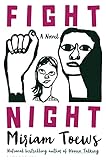 Fight Nightby Miriam Toews: The award-winning author of Women Talking and All My Puny Sorrows is back with a novel as moving as it is full of humor. Swiv is a nine-year-old who lives in Toronto with her pregnant mother and lively grandmother. When Swiv is expelled from school, Grandma takes on the role of teacher. Swiv, in turn, assigns Grandma the job of writing her unborn brother, Gord. “You’re a small thing,” Grandma writes, “and you must learn to fight.” As Susan Cole, in Now Magazine, says, “Few authors mix humor and deep emotion with Toews’s skill.” (Claire)
Fight Nightby Miriam Toews: The award-winning author of Women Talking and All My Puny Sorrows is back with a novel as moving as it is full of humor. Swiv is a nine-year-old who lives in Toronto with her pregnant mother and lively grandmother. When Swiv is expelled from school, Grandma takes on the role of teacher. Swiv, in turn, assigns Grandma the job of writing her unborn brother, Gord. “You’re a small thing,” Grandma writes, “and you must learn to fight.” As Susan Cole, in Now Magazine, says, “Few authors mix humor and deep emotion with Toews’s skill.” (Claire)
 The Pessimists by Bethany Ball: From Richard Ford to Edward Albee, Rick Moody to John Cheever, the American suburbs have always had a dark core underneath the façade of Levittown homes and perfectly manicured front lawns. Ball gives her own spin on the tribulations of suburban ennui in her aptly named new novel The Pessimists. Ball’s second novel is no mid-century rehash, however, because The Pessimists is very much a suburban gothic for our current American dystopia. The denizens of Connecticut’s Gold Coast include Virginia and Trip, the perfect couple, who secretly hoard a cache of basement weapons to survive the apocalypse, as well as the more conventionally despairing Richard and Margot whose trials only include infidelity and mental health crises. Both twistedly dark and wickedly funny, The Pessimists updates our narratives of suburban anguish for an age of American decline. (Ed)
The Pessimists by Bethany Ball: From Richard Ford to Edward Albee, Rick Moody to John Cheever, the American suburbs have always had a dark core underneath the façade of Levittown homes and perfectly manicured front lawns. Ball gives her own spin on the tribulations of suburban ennui in her aptly named new novel The Pessimists. Ball’s second novel is no mid-century rehash, however, because The Pessimists is very much a suburban gothic for our current American dystopia. The denizens of Connecticut’s Gold Coast include Virginia and Trip, the perfect couple, who secretly hoard a cache of basement weapons to survive the apocalypse, as well as the more conventionally despairing Richard and Margot whose trials only include infidelity and mental health crises. Both twistedly dark and wickedly funny, The Pessimists updates our narratives of suburban anguish for an age of American decline. (Ed)
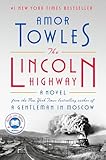 The Lincoln Highway by Amor Towles: It’s June 1954, and 18-year-old Emmett Watson has just finished serving 15 months at the juvenile work farm for involuntary manslaughter. But when he returns home to Nebraska expecting to pick up his kid brother Billy and leave for California to start a new life, he gets a surprise. Two buddies from the work farm are waiting to take him the other way—to New York City, where beguiling characters and adventures await. Told from multiple points of view, the novel is reason to rejoice for Towles’s millions of fans, who made his first two novels, Rules of Civility and A Gentleman in Moscow, runaway international bestsellers. (Bill)
The Lincoln Highway by Amor Towles: It’s June 1954, and 18-year-old Emmett Watson has just finished serving 15 months at the juvenile work farm for involuntary manslaughter. But when he returns home to Nebraska expecting to pick up his kid brother Billy and leave for California to start a new life, he gets a surprise. Two buddies from the work farm are waiting to take him the other way—to New York City, where beguiling characters and adventures await. Told from multiple points of view, the novel is reason to rejoice for Towles’s millions of fans, who made his first two novels, Rules of Civility and A Gentleman in Moscow, runaway international bestsellers. (Bill)
 Pandemonium: A Visual History of Demonology by Ed Simon: Are you endlessly mixing up Asmodeus and Azazel? The Millions’ own Simon can help: he’s mapped out Satan’s family tree. When it comes to Western art and culture, the Devil certainly has been in the details for about five millennia now, and one could argue that his forte—conflict—is at the heart of any story worth reading. So, brush up your demonology with this singular, illustrated treatment that “celebrates the art of hell like never before.” (Il’ja)
Pandemonium: A Visual History of Demonology by Ed Simon: Are you endlessly mixing up Asmodeus and Azazel? The Millions’ own Simon can help: he’s mapped out Satan’s family tree. When it comes to Western art and culture, the Devil certainly has been in the details for about five millennia now, and one could argue that his forte—conflict—is at the heart of any story worth reading. So, brush up your demonology with this singular, illustrated treatment that “celebrates the art of hell like never before.” (Il’ja)
 Dreaming of You by Melissa Lozada-Oliva: This is a novel in verse, fitting for an acclaimed poet who has published three books of poetry. Dreaming of You follows a young Latinx poet who brings the pop star Selena back to life and embarks upon her own journey of hell, including a dead celebrity prom, in an exploration of celebrity, obsession, and identity. Terrance Hayes says of the book: “Melissa Lozada-Oliva’s kinetic, pop-operatic Dreaming of You is like some terrific amalgam of fan fiction and fantasy nonfiction; a Selena monograph made of memoir, myth and magic. Her partly satirical, partly ecstatic linguistics constitute a whole other sort of literary hybrid.” (Lydia)
Dreaming of You by Melissa Lozada-Oliva: This is a novel in verse, fitting for an acclaimed poet who has published three books of poetry. Dreaming of You follows a young Latinx poet who brings the pop star Selena back to life and embarks upon her own journey of hell, including a dead celebrity prom, in an exploration of celebrity, obsession, and identity. Terrance Hayes says of the book: “Melissa Lozada-Oliva’s kinetic, pop-operatic Dreaming of You is like some terrific amalgam of fan fiction and fantasy nonfiction; a Selena monograph made of memoir, myth and magic. Her partly satirical, partly ecstatic linguistics constitute a whole other sort of literary hybrid.” (Lydia)
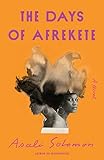 The Days of Afrekete by Asali Solomon: In this new novel from the author of Get Down and Disgruntled, two women who knew each other in college before embarking on very different paths come together in mid-life in a tender, comic, searching novel inspired by Mrs. Dallowayand Sula. Danielle Evans says of the novel, “Asali Solomon illuminates what it means to grow away from what felt like the truest version of yourself, what the way back might look like, what Black women in particular are asked to give up, and what it might mean to refuse. Solomon is a treasure: wise, hilarious, and full of poignant insight.” (Lydia)
The Days of Afrekete by Asali Solomon: In this new novel from the author of Get Down and Disgruntled, two women who knew each other in college before embarking on very different paths come together in mid-life in a tender, comic, searching novel inspired by Mrs. Dallowayand Sula. Danielle Evans says of the novel, “Asali Solomon illuminates what it means to grow away from what felt like the truest version of yourself, what the way back might look like, what Black women in particular are asked to give up, and what it might mean to refuse. Solomon is a treasure: wise, hilarious, and full of poignant insight.” (Lydia)
 Search History by Eugene Lim: The author of the critically acclaimed 2017 novel Dear Cyborgs and The Strangers returns with a kaleidoscopic novel of art, grief, artificial intelligence, identity, and a man who is reincarnated as a dog. John Keene raves, “Lim has found a way to capture both the pointed specificity of the internet and its Borgesian infiniteness, in order to tell a picaresque tale about race and American culture, artificial intelligence, artmaking, storytelling, and so much more.” (Lydia)
Search History by Eugene Lim: The author of the critically acclaimed 2017 novel Dear Cyborgs and The Strangers returns with a kaleidoscopic novel of art, grief, artificial intelligence, identity, and a man who is reincarnated as a dog. John Keene raves, “Lim has found a way to capture both the pointed specificity of the internet and its Borgesian infiniteness, in order to tell a picaresque tale about race and American culture, artificial intelligence, artmaking, storytelling, and so much more.” (Lydia)
 Orwell’s Roses by Rebecca Solnit: Just when you think are you sick of hearing about George Orwell, Solnit, the author of more than 20 books, reveals a surprising side. Orwell was a passionate gardener, and especially enjoyed flowers. “If war has an opposite, gardens might sometimes be it,” the author writes, using this fresh insight to illuminate an absorbing mediation on Orwell’s work as a writer and antifascist. (Marie)
Orwell’s Roses by Rebecca Solnit: Just when you think are you sick of hearing about George Orwell, Solnit, the author of more than 20 books, reveals a surprising side. Orwell was a passionate gardener, and especially enjoyed flowers. “If war has an opposite, gardens might sometimes be it,” the author writes, using this fresh insight to illuminate an absorbing mediation on Orwell’s work as a writer and antifascist. (Marie)
 April in Spain by John Banville: The Booker Prize winner’s latest novel is a mystery set on the coast of the Basque Country in Spain. In San Sebastian, native Dubliner Quirke is struggling to relax and enjoy his time in the countryside, despite the pleasant locale and the amiable company of his wife. Then, one night, he spots a stranger in a bar who looks like April Latimer, the woman his brother murdered years before. He makes a call home to Ireland and summons Det. St. John Strafford, who flies down to Spain at the same time as a hit man, whose ultimate target may just be Quirke himself. (Thom)
April in Spain by John Banville: The Booker Prize winner’s latest novel is a mystery set on the coast of the Basque Country in Spain. In San Sebastian, native Dubliner Quirke is struggling to relax and enjoy his time in the countryside, despite the pleasant locale and the amiable company of his wife. Then, one night, he spots a stranger in a bar who looks like April Latimer, the woman his brother murdered years before. He makes a call home to Ireland and summons Det. St. John Strafford, who flies down to Spain at the same time as a hit man, whose ultimate target may just be Quirke himself. (Thom)
 On Girlhood, edited by Glory Edim: The inaugural book from Edim’s Well-Read Black Girl Library Series features 15 short stories from Black writers. The anthology—which is divided into the four themes of Innocence, Belonging, Love, and Self-Discovery—features short fiction from writers such as Jamaica Kincaid, Toni Morrison, Edwidge Danticat, and Rita Dove. Kirkus‘ starred review calls it “a profound, prismatic collection” that “presents an expansive, decades-spanning view of Black girlhood.” (Carolyn)
On Girlhood, edited by Glory Edim: The inaugural book from Edim’s Well-Read Black Girl Library Series features 15 short stories from Black writers. The anthology—which is divided into the four themes of Innocence, Belonging, Love, and Self-Discovery—features short fiction from writers such as Jamaica Kincaid, Toni Morrison, Edwidge Danticat, and Rita Dove. Kirkus‘ starred review calls it “a profound, prismatic collection” that “presents an expansive, decades-spanning view of Black girlhood.” (Carolyn)
 The Nutmeg’s Curse by Amitav Ghosh: In the successor to his acclaimed book, The Great Derangement, Ghosh explores the origins of the current climate crisis—which he argues is rooted in the centuries-old colonialism and capitalism of Western civilization— through the history of nutmeg. Sunil Amrith writes: “The Nutmeg’s Curse brings to life alternative visions of human flourishing in consonance with the rest of nature—and reminds us how great are the vested interested that obstruct them.” (Carolyn)
The Nutmeg’s Curse by Amitav Ghosh: In the successor to his acclaimed book, The Great Derangement, Ghosh explores the origins of the current climate crisis—which he argues is rooted in the centuries-old colonialism and capitalism of Western civilization— through the history of nutmeg. Sunil Amrith writes: “The Nutmeg’s Curse brings to life alternative visions of human flourishing in consonance with the rest of nature—and reminds us how great are the vested interested that obstruct them.” (Carolyn)
 On Animals by Susan Orlean: In her newest book, New Yorker staff writer and bestselling author Orlean has gathered essays all about animals and animal-human relationships. Whether writing about Biff, the champion boxer dog; Kevin Richardson, the lion whisperer; animal actors in Hollywood; or Keiko, the captive whale who forgot how to be free, Orlean manages to write with empathy, delight, and unending curioisty. Kirkus‘ starred review says the book is “another winner featuring the author’s trademark blend of meticulous research and scintillating writing.” (Carolyn)
On Animals by Susan Orlean: In her newest book, New Yorker staff writer and bestselling author Orlean has gathered essays all about animals and animal-human relationships. Whether writing about Biff, the champion boxer dog; Kevin Richardson, the lion whisperer; animal actors in Hollywood; or Keiko, the captive whale who forgot how to be free, Orlean manages to write with empathy, delight, and unending curioisty. Kirkus‘ starred review says the book is “another winner featuring the author’s trademark blend of meticulous research and scintillating writing.” (Carolyn)
 Cairo Circles by Doma Mahmoud: While living away from his conservative Egyptian family, Sheero, a wealthy undergraduate at NYU, is revealing in his freedom when a visit from the FBI—with news that his estranged cousin has perpetrated a terrible attack—upends his carefree life. Shifting back and forth in time, and spanning over several decades, Mahmoud’s debut novel follows a group of young Egyptians and Egyptian Americans as they struggle against familial, cultural, and class expectations. Raven Leilani says, “Cairo Circles is a deft meditation on how family and class can brighten and distort life’s trajectory and force us to grapple with how closely origin and desire are intertwined.” (Carolyn)
Cairo Circles by Doma Mahmoud: While living away from his conservative Egyptian family, Sheero, a wealthy undergraduate at NYU, is revealing in his freedom when a visit from the FBI—with news that his estranged cousin has perpetrated a terrible attack—upends his carefree life. Shifting back and forth in time, and spanning over several decades, Mahmoud’s debut novel follows a group of young Egyptians and Egyptian Americans as they struggle against familial, cultural, and class expectations. Raven Leilani says, “Cairo Circles is a deft meditation on how family and class can brighten and distort life’s trajectory and force us to grapple with how closely origin and desire are intertwined.” (Carolyn)
 Cascade by Craig Davidson: A mother and son struggle to survive a car crash. A pro basketball player’s decision to punch a fan changes his life forever. Twins in a juvenile detention center discover the ugly truth about each other. In his six-story collection, Scotiabank Giller Prize nominee Davidson (Cataract City) returns to “Cataract City,” his fictionalized version of Niagara Falls, to explore unsettling familial relationships. Publishers Weekly‘s starred review calls the collection “a blissful, wholly satisfying assemblage of cinematic stories, sure to please Davidson’s fans and attract newcomers.” (Carolyn)
Cascade by Craig Davidson: A mother and son struggle to survive a car crash. A pro basketball player’s decision to punch a fan changes his life forever. Twins in a juvenile detention center discover the ugly truth about each other. In his six-story collection, Scotiabank Giller Prize nominee Davidson (Cataract City) returns to “Cataract City,” his fictionalized version of Niagara Falls, to explore unsettling familial relationships. Publishers Weekly‘s starred review calls the collection “a blissful, wholly satisfying assemblage of cinematic stories, sure to please Davidson’s fans and attract newcomers.” (Carolyn)
 The Swank Hotel by Lucy Corin: In the midst of the 2008 financial crisis, Em is working her mindless marketing job while she awaits to hear from Ad, her perpetually-missing sister. The novel oscillates between multiple points of view including Em; her manager, Frank; Frank’s decades-long lover, Jack; Em’s parents; and Tasio, who works for Em’s family and loves Ad. About Corin’s newest, Karen Russell says, “Here is a writer light years ahead of her time returning to explore the recent past of our ongoing American crises.” (Carolyn)
The Swank Hotel by Lucy Corin: In the midst of the 2008 financial crisis, Em is working her mindless marketing job while she awaits to hear from Ad, her perpetually-missing sister. The novel oscillates between multiple points of view including Em; her manager, Frank; Frank’s decades-long lover, Jack; Em’s parents; and Tasio, who works for Em’s family and loves Ad. About Corin’s newest, Karen Russell says, “Here is a writer light years ahead of her time returning to explore the recent past of our ongoing American crises.” (Carolyn)
 Greedy by Jen Winston: In what Publishers Weekly calls a “sparkling” and “wholly original” debut collection, Winston explores bisexuality, gender, and sex with humor, generosity, and earnestness.Winston’s essays explores her confusing and uncertain queer coming-of-age; the harmfulness of biphobia and bi stereotypes (and how to overcome them); the idea of being “queer enough;” and why being “too much” is the least you can do for yourself. (Carolyn)
Greedy by Jen Winston: In what Publishers Weekly calls a “sparkling” and “wholly original” debut collection, Winston explores bisexuality, gender, and sex with humor, generosity, and earnestness.Winston’s essays explores her confusing and uncertain queer coming-of-age; the harmfulness of biphobia and bi stereotypes (and how to overcome them); the idea of being “queer enough;” and why being “too much” is the least you can do for yourself. (Carolyn)
 The Memoirs of Stockholm Sven by by Nathaniel Ian Miller: Longlisted for the Center for Fiction First Novel Prize, Miller’s novel follows 32-year-old Sven Ormson, who flees to a remote fjord with his dog after surviving a near fatal avalanche. After burrowing deep into his isolation and loneliness for decades, Sven’s life is forever altered by an unexpected visitor. Adam Johnson says the novel “illuminates the very nature of human yearning and perseverance,” and that Miller “ascends to the firmament of today’s most exciting young novelists.”(Carolyn)
The Memoirs of Stockholm Sven by by Nathaniel Ian Miller: Longlisted for the Center for Fiction First Novel Prize, Miller’s novel follows 32-year-old Sven Ormson, who flees to a remote fjord with his dog after surviving a near fatal avalanche. After burrowing deep into his isolation and loneliness for decades, Sven’s life is forever altered by an unexpected visitor. Adam Johnson says the novel “illuminates the very nature of human yearning and perseverance,” and that Miller “ascends to the firmament of today’s most exciting young novelists.”(Carolyn)
 I Will Die in a Foreign Land by Kalani Pickhart: In Pickhart’s debut, which is set during the the 2014 Ukrainian Revolution, four people lives overlap, intersect, and irrevocably change in the face of personal, political, and historical turmoil. The ambitious novel has garnered rave starred reviews from both Publishers Weekly (“ardent,” “sprawling,” “bighearted,” “It’s a stunner”) and Kirkus (“Innovative, emotionally resonant, and deeply affecting”). (Carolyn)
I Will Die in a Foreign Land by Kalani Pickhart: In Pickhart’s debut, which is set during the the 2014 Ukrainian Revolution, four people lives overlap, intersect, and irrevocably change in the face of personal, political, and historical turmoil. The ambitious novel has garnered rave starred reviews from both Publishers Weekly (“ardent,” “sprawling,” “bighearted,” “It’s a stunner”) and Kirkus (“Innovative, emotionally resonant, and deeply affecting”). (Carolyn)
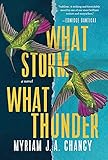 What Storm, What Thunder by Myriam J. A. Chancy: In her newest novel, Chancy (The Loneliness of Angels) follows an interconnected group of survivors—including musicians, architects, drug traffickers, lovers, and merchants—as they struggle to live, love, and hope in the aftermath of Haiti’s devastating 2010 earthquake. A rave starred review from Publishers Weekly says the novel “multilayered,” “dazzling,” and “lyrical” novel is “not to be missed.” (Carolyn)
What Storm, What Thunder by Myriam J. A. Chancy: In her newest novel, Chancy (The Loneliness of Angels) follows an interconnected group of survivors—including musicians, architects, drug traffickers, lovers, and merchants—as they struggle to live, love, and hope in the aftermath of Haiti’s devastating 2010 earthquake. A rave starred review from Publishers Weekly says the novel “multilayered,” “dazzling,” and “lyrical” novel is “not to be missed.” (Carolyn)
 We Imagined It Was Rain by Andrew Siegrist: Set primarily in Tennessee, the stories in Siegrist’s debut story collection explores mundane and life-altering moments with beauty, tenderness, and reverence. About the 2020 C. Michael Curtis Short Story Book Prize winner, Z.Z. Packer writes: ““Reading We Imagined It Was Rain is like entering a dream journal—every sense is heightened and stretched, every memory expanded and reassembled in the hopes of deciphering the past or surviving the present….A keen eye for the truths of the human condition—as well as a mastery of tone, detail, and imagery—make this writer one to watch.” (Carolyn)
We Imagined It Was Rain by Andrew Siegrist: Set primarily in Tennessee, the stories in Siegrist’s debut story collection explores mundane and life-altering moments with beauty, tenderness, and reverence. About the 2020 C. Michael Curtis Short Story Book Prize winner, Z.Z. Packer writes: ““Reading We Imagined It Was Rain is like entering a dream journal—every sense is heightened and stretched, every memory expanded and reassembled in the hopes of deciphering the past or surviving the present….A keen eye for the truths of the human condition—as well as a mastery of tone, detail, and imagery—make this writer one to watch.” (Carolyn)
 The Devil’s Treasure by Mary Gaitskill: In her latest book, Gaitskill’s critiques and reflects on her life’s work. Presenting a bricolage of fiction, memoir, criticism, and visual art, she puts her past and current work in chorus with each other, including her memoir, previous novels (including Veronica and The Mare), a novel in progress, and Gaitskill’s commentary and artwork. (Carolyn)
The Devil’s Treasure by Mary Gaitskill: In her latest book, Gaitskill’s critiques and reflects on her life’s work. Presenting a bricolage of fiction, memoir, criticism, and visual art, she puts her past and current work in chorus with each other, including her memoir, previous novels (including Veronica and The Mare), a novel in progress, and Gaitskill’s commentary and artwork. (Carolyn)
